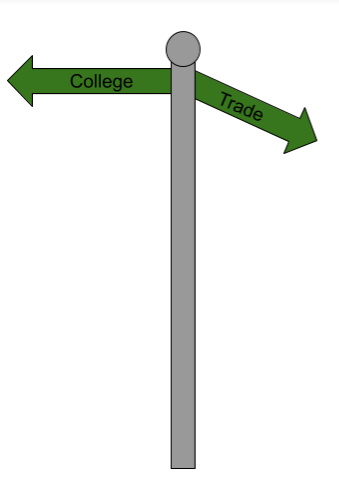Stigmas surrounding gap years pressures students into college or trade
Minding the gap.
During the peak of college application season, students are conditioned to focus on applications or trades.
There has always been a consistent stigma surrounding gap years and those who take them. Living in a society that has either been industrially driven or college driven, seniors often forget that gap years are even a valid option. Despite the stigma however, the option is becoming more normalized within the younger generation.
It seems as though when most schools talk about life after high school it almost always has something to do with jumping straight into a trade or setting you up for college. When schools try to lay out a students options, students often think that they are limited to what is given to them. The lack of discussion and education about taking gaps is what makes students stray away from entertaining the thought of anything other than college or trade. “I think the stigma surrounding gap years exists because some people don’t actually know what a gap year is so they just assume it’s bad to take one. I also think it exists because people don’t truly understand how it works or what goes on during a gap year,” sophomore Shelby Wilcher said.
Gaps are seen as unconventional. Oftentimes it is thought that those who take gap years are lethargic or less likely to return back to school. The Gap Year Association conducted a survey that found 90% of those who took a gap were back in school within a year and also more likely to graduate on time with a higher grade point average. It also showed that 73% of people felt more prepared for college and that it increased 59% of people’s interest in attending college.
After 12 years of schooling, it should be seen as normal and healthy to take a break. The bridge between high school and college is a difficult transition that not everyone is physically or mentally prepared to jump into straight away. Gaps allow students to actually step back and focus on themselves without the pressures or influences that come with school. “I haven’t officially decided to take a gap year but it’s definitely a big contender for me since I haven’t applied for many colleges or scholarships yet because I’m undecided on what I want to do. Also to take time to, not to sound corny, find myself. I think for way too long, school has made me into someone I’m not and I’m slowly trying to become the person I love,” senior Mallory Roby said.
It’s unrealistic to expect most high school graduates to actually know what it is that they are truly passionate about; not a rash decision that is made because “it’s time to make that decision”. Taking a gap allows graduates to make sure that when they do spend the money on college, they’re spending it on something that they’re sure of. Way too often, we see kids who go to college for something just because it’s what their peers were doing or their superiors encouraged them to do it, only just to find out thousands of dollars later that they settled for what they thought they knew; what they thought they wanted and who they want to be don’t align with where they are. “Parents want their kids to go to college so they don’t give the option for a gap year, and when kids hear they’re running out of time it kind of sends us into panic mode. So then we stress out and try to pick a college or trade and ultimately don’t end up happy in what we’re doing. So that either causes us to dropout of college or move onto another trade and that’s a lot of money down the drain,” senior Maddy Lawson said.
Outside of academic and economic benefits, gaps allow people to figure out what it is that they want out of life and who they are as a person without the influence of a school environment. It allows them to push boundaries and open themselves to knowledge that you simply cannot get out of a school environment. The Gap Year Association study found that a gap helped 98% of people develop as a person and 97% found they were more mature.
A gap year blogger, Viola Helen, wrote a blog post entitled, “One Year Ago: Reflections | Gap Year Travel.” In the post she says, “…I definitely think that I’ve managed to cope a lot better with such an intensive environment because I took a year out. I’ve definitely utilised some of the skills I developed while away…It still seems crazy to me that it’s been just over a year. I had such a crazy, whirlwind of a time during my travels – and Alice can certainly testify – and to think that time has continued to whizz by so fast scares me. University this past year has been incredible, but nothing beats travelling and feeling so free.”
To teachers and administrators: be more open minded to the opportunities that exist outside of college and trade. Talk more about the unconventional. Encourage students to push the boundaries and figure out what is out there in the world; to get the life experience that isn’t available in any job or classroom setting.
To the seniors: it may feel like you’re running out of time but as cliche as it sounds, you really do have your whole life ahead of you. You are allowed to be burnt out from the classroom setting given from formal education and want a break. Take your time and figure out what it is that you want out of life and who you are as a person before jumping into the rest of your life.”




